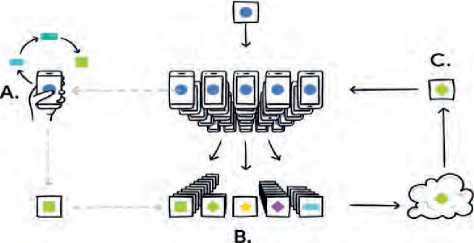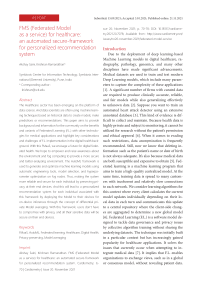FMS (Federated Model as a service) for healthcare: an automated secure-framework for personalized recommendation system
Автор: Akshay Saini, Krishnan Ramanathan
Журнал: Cardiometry @cardiometry
Рубрика: Report
Статья в выпуске: 20, 2021 года.
Бесплатный доступ
The Healthcare sector has been emerging on the platform of data science. And data scientists are often using machine learning techniques based on historical data to create models, make predictions or recommendations. This paper aims to provide background and information for the community on the benefits and variants of Federated Learning (F.L.) with other technologies for medical applications and highlight key considerations and challenges of F.L. implementation in the digital health background. With this FMaaS, we envisage a future for digital federated health. We hope to empower and raise awareness about the environment and fog computing to provide a more secure and better-analyzing environment. The AutoML framework is used to generate and optimize machine learning models using automatic engineering tools, model selection, and hyperparameter optimization on fog nodes. Thus, making the system more reliable and secure for each individual by preserving privacy at their end devices. And this will lead to a personalized recommendation system for each individual associated with this framework by deploying the Model to their devices for on-device inferences through the concept of differential private Model averaging. With this framework, users don’t have to compromise with privacy, and all their sensitive data will be secure on their end devices.
FMaaS, AutoML, Federated learning, Healthcare, Digital Health, Privacy-preserving, Model averaging
Короткий адрес: https://sciup.org/148322435
IDR: 148322435 | DOI: 10.18137/cardiometry.2021.20.7078
Текст научной статьи FMS (Federated Model as a service) for healthcare: an automated secure-framework for personalized recommendation system
sue 20; November 2021; p. 70-78; DOI: 10.18137/cardiome-try.2021.20.7078; Available from: issues/no20-november-2021/federated-model-service
Due to the deployment of deep learning-based Machine Learning models in digital healthcare, radiography, pathology, genomics, and many other disciplines have made significant advancements. Medical datasets are used to train and test modern Deep Learning models, which include many parameters to capture the complexity of these applications [1]. A significant number of firms with curated data are required to produce clinically accurate, reliable, and fair models while also generalizing effectively to unknown data [2]. Suppose you want to train an automated heart attack detector using an extensive annotated database [3]. This kind of evidence is difficult to collect and maintain. Because health data is highly private and subject to monitoring, it cannot be utilized for research without the patient’s permission and ethical approval [4]. When it comes to evading such restrictions, data anonymization is frequently recommended. Still, now we know that deleting information such as the patient’s name or date of birth is not always adequate. It’s also because medical data are both susceptible and expensive to obtain [5]. Federated learning is a machine learning program that aims to train a high-quality centralized model. At the same time, training data is spread to many customers with incoherent and relatively slow connections to each network. We consider learning algorithms for this context where every client calculates the current model updates individually depending on their local data in each turn and communicates this update to a central repository where the client-side changes are aggregated to determine a new global model [6]. Federated Learning (F.L.) is a software model designed to tackle data governance and privacy issues by collective algorithm training without sharing the underlying datasets. The technique was initially built in a particular context but has increasingly gained popularity for healthcare applications. It solves the issues that currently occur when attempting to integrate medical data [7]. It implies that F.L. enables organizations to exchange views, such as in a global or consensus model, without revealing patient data.
Because critical training data cannot be transferred outside the companies’ firewalls in which they reside [8], F.L. has a distinct advantage. Each participating company performs its Machine Learning (ML) process, and only model characteristics (such as parameters and gradients) are shared between them. The informed consensus model benefits from the information collected across all institutions [9] once the training is completed. A successful F.L. implementation has the potential to provide precision medicine on a broad scale, and we think that this is the case. This would promote models that make objective judgments, ideally reflect a person’s physiology and react to uncommon illnesses in a way that respects concerns of governance and privacy, especially in pandemic situations like COVID-19 [10].
The recent rapid growth of medical computerization and subsequent developments in clinical science’s automated data processing produce large amounts of data from healthcare. The proper usage of these large data is directly linked to the success of the health sector as a whole which is of tremendous concern regarding medications, medical treatment which public safety [11]. Accordingly, regulatory frameworks or privacy protections have been established to limit access to data. The Protections for the Protection of Personally Identifiable Health Records, commonly known as the HIPAA (Health Insurance Portability and Transparency Act) Protection Rule2, sets the first national requirements for protecting confidential or secure health records (PHI) for patients in the United States. On 25 May 2018, the European Union’s General Data Protection Regulation (GDPR) established strict data security and privacy rules, highlighting the need for an open and transparent collection of user data [12]. The balance between processing medical data and preserving patients’ privacy has also become an important and challenging problem. Federated learning, an approach for developing a shared global model with a central repository while maintaining all confidential data in local entities where the data belongs, is yet another effort to connect the scattered sources of health care data while losing data privacy [13].
And to simplify and render modeling more compatible with the data type of data collected from wearable devices and other end devices and more reliable and efficient, we use the concept of AutoML to render our approach more manageable in terms of reiterating the Model to find the best prediction. AutoML refers to systems that, in every phase of the data sciences, automatically pick and optimize the Model of machine learning [14]. The function creation process is stressful for data scientists, so several solutions have been suggested to create new parameters dynamically and choose the best subset of parameters while maintaining the high-performance model [15].
Conceptual Model and Related work
It is a machine learning standard to centralise the training data on a single computer or in a data centre. Also, Google has built a cloud infrastructure that is one of the biggest and most reliable, which allows us to analyse the data and improve our services.
While retaining all of the system’s training data, federated learning allows mobile phones to learn a particular prediction model without having to save cloud data [16]. In this, the current Model is downloaded from your computer, enhanced by learning from your phone’s data, and then summarized as a tiny centered change update. Using encrypted communication, this model update is sent to the cloud only, where it is automatically pooled to enhance the shared Model along with other user changes [17]. All training data is left on your computer, and there are no individual updates in the cloud.
On Android, Federated learning uses the on-device history to propose improvements to the suggested question model for the next version of Gboard. This system requires sophisticated stacking technology to extend to millions of heterogeneous Gboard-running phones [17]. The system will then need to communicate and aggregate updates of the Model in a manner that is stable, efficient, scalable, and tolerant to faults which is shown in Figure 1.

Figure 1. The Model is customized locally by your computer, based on your use (A). Multiple user modifications are aggregated (B) to create a consensus adaptation (C) to the common norm, after which the cycle is repeated.
Список литературы FMS (Federated Model as a service) for healthcare: an automated secure-framework for personalized recommendation system
- Bo nawitz K, et al. Towards Federated Learning at Scale: System Design. 2019. ArXiv, abs/1902.01046.
- Ch auhan, K., et al. Automated Machine Learning: The New Wave of Machine Learning. 2020 2nd International Conference on Innovative Mechanisms for Industry Applications (ICIMIA), 205-212.
- Ch en Y, Chuang Y, Wu A. Online Extreme Learning Machine Design for the Application of Federated Learning. 2020 2nd IEEE International Conference on Artificial Intelligence Circuits and Systems (AICAS), 188-192.
- Drozdal J, et al. Trust in AutoML: exploring information needs for establishing trust in automated machine learning systems. 2020. Proceedings of the 25th International Conference on Intelligent User Interfaces.
- He Y, et al. AMC: AutoML for Model Compression and Acceleration on Mobile Devices. 2018. ECCV.
- Ko necný J, et al. Federated Learning: Strategies for Improving Communication Efficiency. 2016. ArXiv, abs/1610.05492.
- Li , Z., et al. A Blockchain and AutoML Approach for Open and Automated Customer Service. IEEE Transactions on Industrial Informatics. 2019; 15:3642-51.
- Lu X, Liao Y, Lió P, Hui P. Privacy-Preserving Asynchronous Federated Learning Mechanism for Edge Network Computing. IEEE Access. 2020;8:48970-81.
- Wong W, Zavodovski A, Zhou P, Kangasharju J, 2019, December. Container deployment strategy for edge networking. In Proceedings of the 4th Workshop on Middleware for Edge Clouds & Cloudlets (pp. 1-6).
- Na diger, C., Kumar, A.A., & Abdelhak, S. (2019). Federated Reinforcement Learning for Fast Personalization. 2019 IEEE Second International Conference on Artificial Intelligence and Knowledge Engineering (AIKE), 123-127.
- Oy amada M. Extracting Feature Engineering Knowledge from Data Science Notebooks. 2019 IEEE International Conference on Big Data (Big Data), 6172-6173.
- Ri eke N, et al. The Future of Digital Health with Federated Learning. 2020. ArXiv, abs/2003.08119.
- Su X, Meng L, Huang J. Intelligent maritime networking with edge services and computing capability. IEEE Transactions on Vehicular Technology. 2020:69(11):13606-20.
- Sa ttler F, Wiedemann S, Müller K, Samek W. Robust and Communication-Efficient Federated Learning from Non-IID Data. IEEE transactions on neural networks and learning systems. 2019.
- Sh ishvan OR, Zois D, Soyata T. Machine Intelligence in Healthcare and Medical Cyber-Physical Systems: A Survey. IEEE Access. 2018;6:46419-94.
- Tr uong A, et al. (2019). Towards Automated Machine Learning: Evaluation and Comparison of AutoML Approaches and Tools. 2019 IEEE 31st International Conference on Tools with Artificial Intelligence (ICTAI), 1471-1479.
- Wa ring J, Lindvall C, Umeton R. Automated machine learning: Review of the state-of-the-art and opportunities for healthcare. Artificial intelligence in medicine. 2020;104: 101822.
- Wo ng Catherine, et al. “Transfer Learning with Neural AutoML.” NeurIPS. 2018.
- Xu J, Wang F. Federated Learning for Healthcare Informatics. 2019. ArXiv, abs/1911.06270.
- Xu e C, et al. Transferable AutoML by Model Sharing Over Grouped Datasets. 2019 IEEE/CVF Conference on Computer Vision and Pattern Recognition CVPR), 2019. 8994-9003.
- Pravin RA, Mageswari U. Preserving Privacy Using an Unobservable Secure Routing Protocol for MANETs. International Journal of MC Square Scientific Research. 2013;5(1).
- Ya o X, et al. Towards Faster and Better Federated Learning: A Feature Fusion Approach. 2019 IEEE International Conference on Image Processing (ICIP), 175-179.


